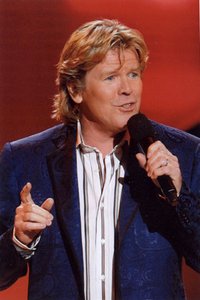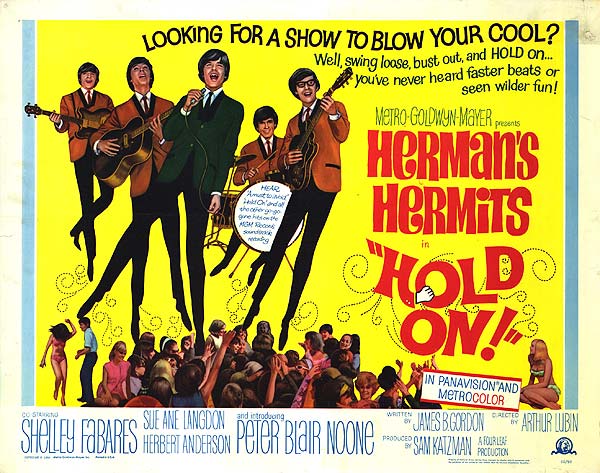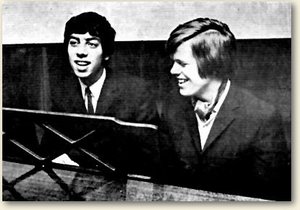True story: in the mid-1960s, Herman’s Hermits were so big that they starred in two – count ’em – two feature films. You try and tell the young people of today that, they won’t believe you. But now, thanks to the fine folks at Warner Archive, you can strap your kids down (please note that Popdose.com does not formally endorse the strapping down of children) and prove to them that you’re right by forcing them to watch “Hold On” and “Mrs. Brown, You’ve Got a Lovely Daughter,” which have at long last been made available on DVD. Former Herman’s Hermits frontman Peter Noone did a round of publicity to promote the reissue of his former band’s former glories – well, okay, even he admits that they’re not exactly classics – and gave Popdose the chance to ask him about the films, the music, and even a bit about his non-Hermits work.

Popdose: So how bizarre was it when you found out that “Hold On” and “Mrs. Brown, You’ve Got a Lovely Daughter” were being released on DVD after all this time?
Peter Noone: It was odd, but, you know, people have been asking me for years when they were going to come out again and how they could get them, and I was always saying, ”Well, you’re just gonna have to wait til Turner (Classic Movies) shows it, cause they’re not gonna put it out. So you’ll have to get a copy off the TV or borrow somebody’s old VHS.” But I think it’s good. I’m amazed that there’s still a demand for that kind of stuff, cause, you know, they weren’t… (Hesitates) They were made to sell soundtracks. Nobody knew that, 40 years later, people would still be buying the records. It’s kind of amazing, really. It’s just amazing that people still care about that stuff. It’s a pleasure that they even care, and that these things have such an afterlife. It’s hardly like they’re Hollywood classics! (Laughs)
A lot of kids today may not realize that, in the mid-1960s, it was practically standard operating procedure for British bands to have their own films.
Yeah, where we jumped out of the loop was…the Beatles ran away from girls and the Dave Clark Five ran away from girls, but we slowed down for the really sexy ones. So we set a new standard for British rock bands!

What was it like working with Arthur Lubin on “Hold On”?
That was part of the dealmaker. He’d done the Three Stooges, and he’d done ”Mr. Ed,” and he was kind of one of the people happening in the business. It was easy for us to work with him. We were, like, ”Well, he obviously knows what he’s doing!”
Clearly. After all, he did ”The Incredible Mr. Limpet.”
(Laughs) I’d forgotten about that! Yeah, he was the real thing, wasn’t he? He was amazing. And he was a real gentleman. He gave us all kinds of good advice. I was already an actor — I’d already gone through acting school and stuff like that — but none of the others had. They were just thrown into the deep end. And he gave them time to be…themselves, basically.
Yeah, I was going to say that, although it was relatively familiar territory for you, did you get the impression that anyone else in the band was somewhat reticent to have to step before the camera?
Well, you know, they didn’t understand that the process was that you didn’t just learn the lines, you sort of developed a way of saying them. So saying… (Adopts a staccato tone) ”This is a fun trip,” it doesn’t really work that well. You have to try it a few ways before the camera shoots it. But that became the amusing part of it all. That was how they were going to say their lines. But it was just a great experience for everybody, you know?
Held by side, which experience was the more enjoyable for you: ”Hold On” or ”Mrs. Brown, You’ve Got A Lovely Daughter”?
You know, I think ”Hold On,” because I think it was right out of the box. It was very wild. We had total control over the songs, and we just did mad stuff. They said, ”What song do you want to sing in the spaceship?” And we said, ”Leaning on a Lamppost.” It’s just odd, really, that we would go there. But Arthur Lubin went with it. He thought, ”Well, I guess they know what they’re doing, these guys.” They didn’t realize that we didn’t just look 16, we were 16. We weren’t actors! But they let us do just about whatever we wanted. Except…the original working title was ”There’s No Place like Space,” and we didn’t like that, so this guy P.F. Sloan, who wrote ”Eve of Destruction,” had written this song called ”A Must to Avoid.” So we said, ”That’s a great idea for the picture! We’ll call it Herman’s Hermits: A Must to Avoid’!” And…he didn’t go quite that far. (Laughs) But we did get another song by P.F. Sloan called ”Hold On,” and so they wrote a scene, basically, where I was on a rollercoaster and where I would hold on. D’you see what I mean? It sounds like wild, wacky stuff, but it was all real!
Of course, the critics would’ve had a field day if you’d given them a film called ”A Must to Avoid.”
Yeah, exactly. But we wanted it to be called that! I thought that would’ve been a funny idea. And our fans would’ve gotten it. A movie called ”A Must to Avoid,” that would’ve been a good joke, I think. But we did still get to sing ”Leaning on a Lampost” in a spaceship, which I still think is pretty brilliant.
How was Shelley Fabares to work with? She was quite the cutie.
Oh, she was great. I was in love with her. I didn’t have to act that part. (Laughs) It was really easy to fall in love with her. She was married to Lou Adler at the time, but, yeah, I was still in love. No acting there!
Were there any specific highlights to working on “Mrs. Brown” that stand out?
You know, it was always good to work with those great old British character actors. You may not know who they were, but there were all these strange outside characters that we would come up against. Stanley Holloway was one. Mona Washbourne was another. They were all fabulous English theatrical people. And we had Nat Jackley! Mr. Rubberneck, Nat Jackley, who no Americans know, but everybody in Britain knew him as just this amazing character actor who did a funny dance.
I wanted to ask you about some of your other work over the years. First of all, are you glad that your album with The Tremblers is finally getting some belated recognition, now that it’s been reissued?
You know, it’s funny: someone just ordered a copy of it today from my website! I think every time someone talks about me and they mention that I was in another band, they look it up and check it out. It’s quite a fun little record. I wish there were three of those. But we only got to make one real Tremblers record.
What was the impetus for going that direction at the time? Just a desire to try something different?
Yeah, y’know, I just thought it was…like, the ’80s were sort of reminiscent of the ’60s, and I thought my songs would work. And they did. It was the end of that ’60s run, where all the people who were running labels knew what was going on. It was suddenly a bunch of people who didn’t really like music running the labels. So I sort of showed up the wrong time, if you know what I mean.
How did you come to hook up with Richard X. Heyman?
You know, I was familiar with his work, and somebody introduced us, and we went and recorded a song (“Hoosier Girl“). He had a studio in his house, and we just went over there that night and recorded a song. We did a few others after that. He’s got loads of fans, you know. He’s got quite a following. And then I went to see him at a couple of gigs, and we got on really well. I liked his music. It’s pop. You know the way that goes. (Laughs)
I wanted to ask about Herman’s Hermits’ relationship with Graham Gouldman. It must’ve been phenomenal to have a songwriter of his caliber in your corner.

Well, he was underestimated at the time, I thought. He was, like, right up there with Lennon & McCartney, writing songs for everybody, and people just didn’t know. People didn’t know how good he was. I mean, I now do “Listen People” on stage the way he played it to me when I first heard it. You know, that was made on a movie Foley stage, that record. The story about “Listen People” is that we were on this movie set, and we were going to do “Bidin’ My Time,” which was a remake of a song from “Girl Crazy,” so, y’know, it was a song written by Gershwin. So we’d learned that, but when we got to the studio, Liberace was on the set, and he was singing a song called “Aruba Liberace.” So I said to the director, “Forgive me for asking this, I may be out of order, but I don’t remember George Gershwin writing a song called ‘Aruba Liberace.'” And he said, no, he didn’t, but then he said the fatal words, “Well, Liberace insisted on doing one of his own songs.” So I said, “Well, we insist on doing one of our own songs as well, if he’s going to get to do one of his own songs!” Now, we’d already recorded “Bidin’ My Time,” but we said, “We’ve got this other song, ‘Listen People,’ that’d be great!” But they wanted people to be able to dance to it…and “Listen People” isn’t really a dance track. But we went into the little Foley room, we played it, and we recorded it with no echo and no effects, thinking it was just something that we could build on. Well, they put that out as a single. It wasn’t even finished! So now I do it how it was supposed to be when I’m on stage. I’ve even done it with symphonies. As far as some of Graham’s other songs, the Herman’s Hermits version of “No Milk Today” has had over four million visitors. It just keeps going. And in my show, I do “Bus Stop,” which we recorded first, and I do “For Your Love,” which we recorded first. We did “It’s Nice to Get Out in the Morning.” I mean, he’s got a massive amount of stuff. And we wrote loads of songs together, too. They just weren’t any good. (Laughs) He was better on his own. When I got involved in the songwriting, it fell apart!
Do you have a favorite cover version of a Herman’s Hermits song that you’ve heard?
Yeah, I like the Shaggs’ “I’m Henry the Eighth, I Am.” (Laughs) It’s a long time ago, but there was this band called the Shaggs, and they did a version that I thought had the same kind of enthusiasm that we had. And I liked when the Ramones did a bit of it in that song of theirs (“Judy is a Punk”), where they go, “Second verse, same as the first.” I liked that.
I don’t know if you’ve heard it, but I’m a big fan of Morrissey’s take on “East West.”
I am, too. I’m very familiar with it. It’s a different approach to it, but it’s a great song, isn’t it? And there you go: that’s another Graham Gouldman one that people have forgot. That’s a brilliant song. We can only play it around Christmas, though. That’s why it’s sort of forgotten, you see. It’s a song about Christmas, so we only play it at Christmas shows.
I already had the Herman’s Hermits best-of collection when I heard his version, but “East West” wasn’t on that best-of (they’ve since released a much more comprehensive single-disc collection that has remedied this problem), so immediately I was, like, “Well, time to bulk up the collection a bit more…”
Great record, definitely. I’ve got the Morrissey one myself. He was a big fan of Herman’s Hermits. A lot of those Manchester guys were fans of Herman’s Hermits. We kind of get forgotten in that Manchester rock scene. They go, “Oh, well, the Smiths,” but they forget Herman’s Hermits, or Freddie and the Dreamers, or Wayne Fontana and the Mindbenders. There were some great bands in Manchester.
Do you have a favorite Herman’s Hermits single that never got as much love as you thought it ought to have?
Yeah, I like “Don’t Go Out Into the Rain.” I think that was a good one, and it…it’s just sort of a forgotten one. You know, my personal favorites are always going to be “I’m Into Something Good” and “No Milk Today,” because they just represent us best. They’re great pop records with exactly the right kind of enthusiasm, played exactly the right way. It’s really hard to recreate that now. But I try. (Laughs)
Lastly, do you ever consider making a go at another studio album? I mean, certainly you’re still out there touring with the classic songs, but you’re obviously still in fine vocal form.
Yeah, you know, I’ve managed to take care. And a woman called Marge Rivingston taught me how to sing. After 20 years in the business, I took my first singing lesson. (Laughs) But it really helped! I was able to figure out that I had to treat it like I was an athlete and get ready for the game. You know, to warm up. And that saved me. Now I’m able to sing better than I ever used to. I also used to smoke, which is kind of insane, when you think about it. I was one of those two-pack-a-day guys who was convinced that I could be a singer and smoke, too, ’cause John Lennon did it.
Not so much.
No. (Laughs) I had to quit that. But it’s worked out alright!




Comments